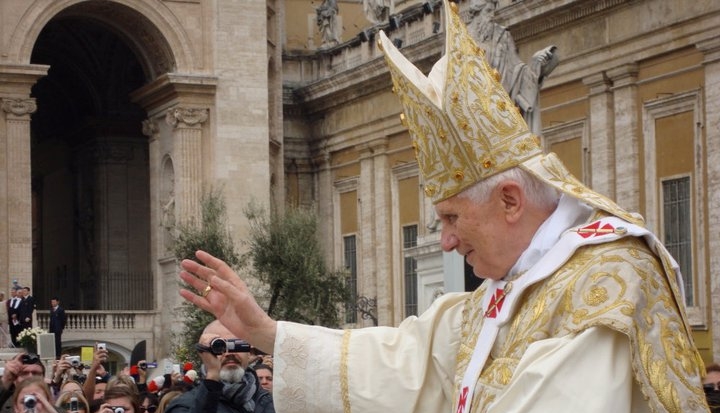I say that in all seriousness, and not because Pope Benedict XVI has not been my favorite pope of all time.
Pope Benedict's resignation tells me that he knows his role, both his role as bishop of Rome, and his role as successor to Pope John Paul II. Joseph Ratzinger was elected as a short-term caretaker pope, and eight years (or nearly eight) is a sufficient amount of time to let the aura of Pope John Paul II's too-long papacy dissipate. But I also think Ratzinger knows his limits and what the church needs in a way that Wojtyla did not. While I think Pope John Paul II saw himself as personally called by God to live out the end of his papacy as he did, Benedict, on the other hand, leans into the job with the mind of a professor: The work he set for himself to do is done; now it is time for someone else. And he has had the courage to admit it; I suspect it will become a "tradition," especially given the long lives contemporary popes can expect to have.
Just who that someone else will be is an important question. Benedict has been steadily promoting Archbishop of Manila Luis Antonio Tagle over the past couple of years, and I wonder if Tagle is not in some way Ratzinger's chosen successor. Tagle is sufficiently theologically conservative, an outspoken promoter of justice for the poor (without ever crossing the line to liberation theology), and he is from the Phillippines, which means he is from the Global South, from a country of encounter with Islam, and from Asia, or at least the zone of Asia. I'll be interested to see how Benedict participates (or doesn't) in the selection of the next pope. He is too old to vote in the conclave, and he's technically not a cardinal anyway, so I suspect whatever he does will be behind the scenes.
Which takes us, finally, to Benedict's legacy. The New York Times coverage has made much of the fact that the Vatican has finally had to deal with the sex abuse scandal during the papacy of Benedict, and because Joseph Ratzinger was such a significant part of the John Paul II papacy, it hasn't reflected well on him. Nevertheless, I don't think his resignation has anything to do with sex abuse, and I don't think he will be remembered through its lens, though he did notably meet with victims.
Overall, however, I think the Ratzinger papacy will soon be forgotten–and I wonder if that wasn't Benedict's goal. I suspect that he thought the papacy became too large under his predecessor, and if Benedict is anything, he is a traditionalist. I admit I was bitterly disappointed when he was chosen as pope–primarily because he was such a polarizing figure identified with a particular party in the church–but I must give him credit for trying to maintain (believe it or not!) a middle course. Nothing that was unresolved when he came to the chair of Peter has been resolved; the church as a whole is frankly no more conservative than before, nor is it any more liberal. Let us hope his successor is able to steer the ship on a new, hopeful, and exciting course.
Wanted to add a h/t to Josh McElwee over at NCR for his take on the resignation.
Image by Caitlyn Schmid
Homepage Image by Oliver Bonjoch via Creative Commons









